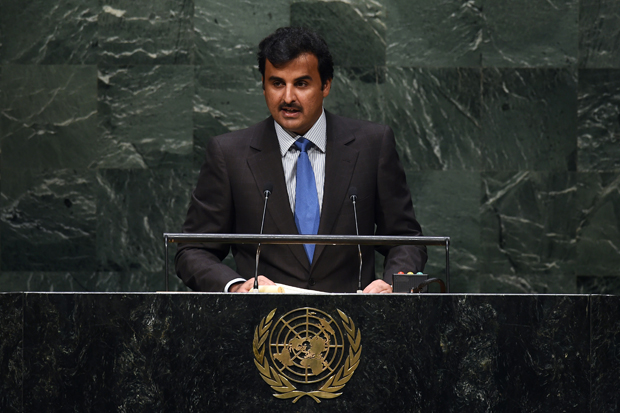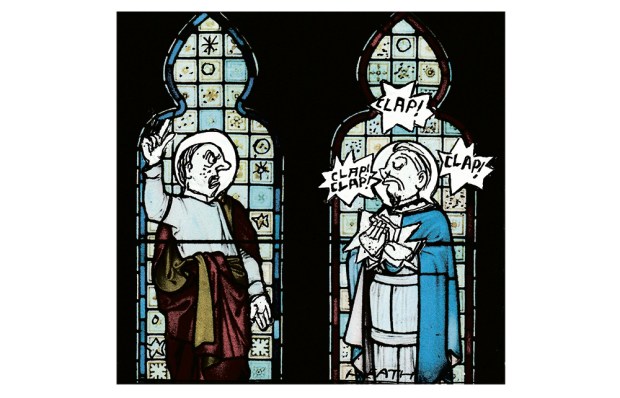On 17 June, a meeting of the Henry Jackson Society, held in the House of Commons, discussed (according to the minutes published on the society’s website) how a tribal elder in northern Cameroon who runs a car import business in Qatar has become one of the main intermediaries between kidnappers from Boko Haram and its offshoot Ansaru and those seeking to free hostages. It was alleged that embezzlement of funds going to Qatar via car imports might be disguising ransom payments. It was also alleged that Qatar was involved in financing Islamist militant groups in West Africa, helping with weapons and ideological training, and (with Saudi Arabia) funding the building of mosques in Mali and Nigeria that preach a highly intolerant version of Islam.
This was far from the only time such accusations have been levelled. Yet Qatar is supposed to be one of our allies, supporting air strikes against the Islamic State. Its ruler even thinks his enormous wealth entitles him to blag his way into Her Majesty’s carriage at Royal Ascot. Given Qatar’s questionable role in the current tide of savage Islamism, should its ruler be allowed anywhere near our Queen? And should they be allowed to buy up our country, as they have done relentlessly since the crash of 2008?
After the overthrow of President Morsi of Egypt, Qatar became a place of refuge for the Muslim Brotherhood. However, on 12 September it asked several leading Brotherhood figures to leave. They duly did, not in outrage or indignation, but apologising for causing embarrassment. Clearly, they felt a debt to the Qataris, and a senior Brotherhood spokesman, Amr Darrag, said what it was. He issued a statement thanking Qataris for their support to ‘the Egyptian people in their revolution against the military junta’.
Qatar asked its former friends to leave because of pressure applied by Saudi Arabia and the United Arab Emirates. Some may come to London: there is already a group of Brotherhood members in Cricklewood, under scrutiny from the authorities. But even now, Qatar remains home to an array of exiled Islamists, and thus a focus of suspicion to its neighbours. Bahrain joined Saudi Arabia and the UAE in withdrawing its ambassador from Doha this spring. It has been widely reported that Qatari money funds extremists in Libya, and when these ambassadors were recalled, the Zionist Organisation of America asked the US government to declare Qatar a state sponsor of terrorism.
The Emir of Qatar’s personal fortune and the country’s sovereign wealth fund are rumoured to amount to £50 billion. Qataris own substantial amounts of real estate — such as the Shard, the Olympic Village, One Hyde Park, a part of Canary Wharf, the United States Embassy building in Grosvenor Square, the Chelsea Barracks development and Harrods. They have large stakes in the stock exchange, Sainsburys and Barclays bank. Almost all Britain’s liquefied natural gas comes from Qatar, accounting for a quarter of our gas needs. The desert state has also bought the 2022 World Cup — rather like playing a cricket Test series at the South Pole — in a fashion so seemingly corrupt that there have been widespread calls for a boycott.
Sir John Jenkins, the British ambassador to Saudi Arabia, has compiled a report exposing extremist activity among members of the Brotherhood and their links to jihadis. It named three Muslim charities in Britain that seemed to be sending funds to extremists in the Middle East. At the very least this should lead Britain to expel members of the Brotherhood, close down the charities and sequester their funds; but the problem will never be dealt with until the source of the funding is cut off. At some stage the British government must ask itself a simple question: however much we want Qatari gas, how much longer can we permit commercial relations with such people?
In June the American magazine The Atlantic asserted that Jabhat al-Nusra, an al-Qa’eda proxy in Syria, had somehow received ‘Qatar’s economic and military largesse’. There is no suggestion this was sanctioned or funded by the Qatari government: but every suggestion it came from interest groups based in Qatar and wealthy Qatari nationals. The problem has been around for years. Wikileaks published a memorandum from Hillary Clinton, when US secretary of state, saying Qatar had the worst record of counter-terrorism co-operation of any ally of the United States.
The Qatari foreign minister, Khalid al-Attiyah, called claims such as The Atlantic’s ‘Qatar-bashing’, and denied the country or anyone in it was bankrolling IS. Certainly, most of the evidence for IS’s funding points to groups and individuals in Saudi Arabia. However, Saudi Arabia may provide training camps for anti-IS groups from Syria approved by the Americans. In response to a US request for similar assistance, the Qataris said it would be ‘premature’. Meanwhile, the Americans continue to accuse Qatar and Kuwait of being ‘permissive environments’ for the funding of terrorism, and believe Qatar has unhealthily close links with Jabhat al-Nusra. Certainly, Mr Attiyah has sought to play down its activities by pointing instead to atrocities committed by those loyal to Bashar al-Assad.
Israel has driven America’s scepticism over Qatar, accusing it of funding Hamas and of exporting terror not just through Jabhat al-Nusra but through IS. A German minister, Gerd Müller, then said that when the question was raised about funding IS, ‘The key word there is Qatar.’ This brought an immediate repudiation from the Qataris, who argued they had been among the first to condemn the beheading of the murdered American hostage James Foley.
However, the Americans — whose largest base in the Middle East is, ironically, at Al Udeid in Doha — believe Qatar has funded extremists not merely in Syria and Libya but also in Tunisia, Mali and Iraq. Another Wikileaks cable revealed Meir Degan, a former head of Mossad, telling the US that ‘Qatar is trying to cosy up to everyone’, and warning America to close its bases there.
Qatar’s pretence that it is an honest broker in the Middle East, attempting to see all sides of an argument, may wash in Doha. It won’t, however, resonate in countries such as Britain and America whose citizens are targeted by jihadis financed by people who may be Qataris, and who have enjoyed Qatari hospitality. Qatar needs to be reminded that the civilised parts of the world with which it does business won’t tolerate apologists for savage extremists. It can’t face both ways on this. Britain must expel members of the Brotherhood and sequester their funds. And it must tell Qatar that unless it stops turning a blind eye to some of its people funding murder and extremism, and stops equivocating about extremists, its assets will be frozen and trade with it suspended until it does.
Got something to add? Join the discussion and comment below.
Get 10 issues for just $10
Subscribe to The Spectator Australia today for the next 10 magazine issues, plus full online access, for just $10.
Simon Heffer, is a columnist for the Daily Mail and a former deputy editor of The Spectator.
You might disagree with half of it, but you’ll enjoy reading all of it. Try your first month for free, then just $2 a week for the remainder of your first year.














Comments
Don't miss out
Join the conversation with other Spectator Australia readers. Subscribe to leave a comment.
SUBSCRIBEAlready a subscriber? Log in